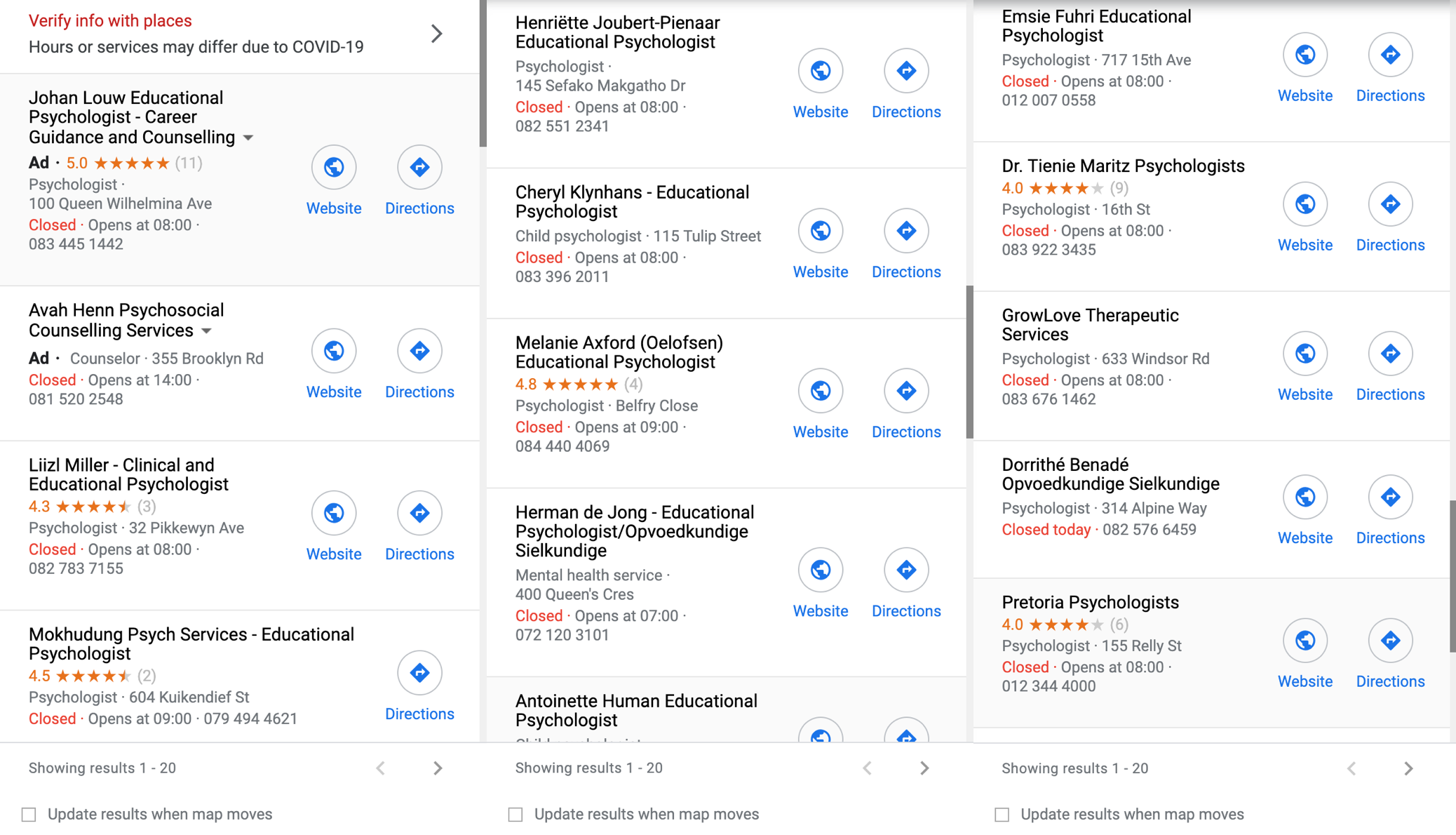
Background
Historically, access to many professions in South Africa were restricted based on race. This limited opportunities for people of color to gain experience in certain fields, including psychology. As a result, some communities may misinterpret the profession due to a lack of familiarity. Additionally, the current dominance of Caucasian professionals in psychology can further contribute to this misunderstanding.
Challenge
Increasing visibility and fostering trust in a mental health practice serving all communities in South Africa, where awareness and acceptance of therapy may be limited and cultural considerations are crucial.
* Medpages
Journey to discovery.
I first looked at the channels that Mokhudung Psychological Services were using to reach clients. Mainly through word of mouth.
Secondly through Medpages (a database for information on people, practices, and organizations in the healthcare industry in Southern Africa), on the paid plan. For the amount being spent on the subscription, the practice felt that it was not a worthwhile endeavor so it needed another avenue.
Insights
What I discovered when I went through this platform was that it was providing information that one could find on google, but google had more. So to use this platform firstly you would have to know about Medpages and then receive information that one could readily find on google. I looked up its web analytics to see how it was doing in terms of traffic. Less than 5000 people were visiting the site per month with an average of 62% bounce rate. The problem here was that the Practice’s success would be closely tied to whether or not Medpages is doing well in the public space. It would be better if the site had more traffic but it still wouldn’t guarantee that Mokhudung Psychological services would be seen. The practices did not pop up in alphabetical order or area/proximity to the searcher.

Let's get thinking
From the information that I had gathered. I suggested building a website for the practice. My assumptions were that 1) Having details pop up on google when a search is performed would help with visibility, but you still needed to build trust. 2) A website could house information that would build trust with the potential client which could lead to a booking being made.
Insights
Not enough information on educational psychology.
No images that readily communicate their function. T
he most common stream of psychology in South Africa is that of Clinical Psychology, usually accessed through hospitals and referrals by doctors.
The Clinical Psychologist works with the wellbeing of the body and mind and this is done through a hospital, whereas the Educational psychologist works with the well being of the body and mind in relation to learning.
Discovering the user's journey
Most of the clients that would discover the practice through the website had been told by their Child’s school to seek the help of an educational psychologist. For many, it was the first time hearing of this specialization. Following an online search, they would choose a private practice that stood out for them. Upon further investigation. People of color, mostly African people would click on this practice’s website because it had an African sounding name. On the website, they would discover that the Educational Psychologist is indeed African and then they would call rather than leave a note on the website to be contacted back
Insights
Even if the school had an in-house Educational Psychologist. Many parents were skeptical that the findings would agree with the school and not be impartial.
Finding someone that looked like them, meant that they could explain better in their own African language who would understand what they perceived as their unique context.
Parents would call to make sure that the psychologist could actually help them with their situation. No two people are the same and some complexities may mean you actually need a different specialist.
The Psychologist also preferred this method as she could readily screen the people and have an idea of what she would need for when the clients arrive for their appointments.

Who are the players in this space?
I conducted a competitor analysis. I was trying to discover:
1) How many educational psychologists/practices would show up in a search?
2) How many of them were people of color?
Insight
Of 22 Educational Psychology practices that would show up on a Google search in Gauteng. Only 2 were people of color. 1 of them being African. This, in a country where 80% of the population is African.
A sense of legitimacy
I started with designs that focused on communicating information about the services offered and who would be doing the assessments along with where these would take place. Using images that also reinforced the kinds of services offered with color that would encourage trust and calmness. Along with SEO for the website to feature amongst the top when Educational psychologist in the area is searched.
Insight
Having a website created a sense of legitimacy and trust for the clients that were now making bookings.

The ball is rolling!
The results were almost instantaneous. Within the first month, there was an average of 3 clients calling each week as a result of the website. Of those that made a booking, above 80% would arrive for the appointment. A massive increase from the average of 3 in 6 months using the former web channel.
Final thoughts.
This process enlightened me on how representation is important as there are people who are avoiding much-needed services because they don’t feel like they would be understood. Further engagements and articles to dispel myths about seeing a psychologist, more importantly, an educational psychologist would go a long way in normalizing this line of specialization in the public sphere.

